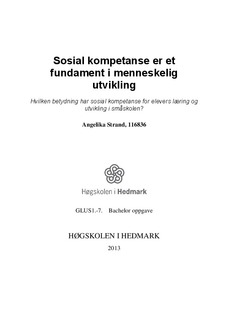| dc.contributor.author | Strand, Angelika | |
| dc.date.accessioned | 2013-09-24T07:53:17Z | |
| dc.date.available | 2013-09-24T07:53:17Z | |
| dc.date.issued | 2013 | |
| dc.identifier.uri | http://hdl.handle.net/11250/132934 | |
| dc.description | Bacheloroppgave, grunnskolelærerutdanning, 2013 | no_NO |
| dc.description.abstract | Denne bachelor oppgaven har rettet fokus på betydning av sosial kompetanse for elevers læring og personlig utvikling i de første skoleårene. Følgende problemstillingen er belyst: Hvilken betydning har sosial kompetanse for elevers læring og utvikling i småskolen? Denne innebærer: Hva legges i forståelsen av begrepet sosial kompetanse i et pedagogisk perspektiv? Hvilke sammenhenger finnes det mellom sosial kompetanse og identitetsdanning? Hvilken rolle har sosial kompetanse i læring som en sosial prosess?
Hvordan foregår sosialisering i småskolen, og hvilke sosiale utfordringer møter elevene under skoleoppstart? Oppgaven drøfter videre noen sammenhenger som finnes mellom sosial kompetanse og skolefaglige prestasjoner, og reflekterer deretter rundt disse spørsmål: På hvilke måte kan tidlig satsing på utvikling av sosial kompetanse fremme elevenes læring? Hvordan kan sosial kompetanse igjennom samarbeidsaktiviteter bidra til å øke elevenes motivasjon, engasjement og aktiv deltakelse i undervisning? Denne bachelor oppgaven skrives som en teoretisk oppgave, basert på forskning, data fra Statistisk Sentralt byrå, fagdidaktisk litteratur innenfor pedagogikk og pedagogisk psykologi underbygger refleksjoner og drøfting rundt temaet. Tittelen i oppgaven Sosial kompetanse er et fundament i menneskelig utvikling symboliserer den generelle betydning sosial kompetanse har i menneskelig utvikling, mens undertittelen Hvilken betydning har sosial kompetanse for elevers læring og utvikling i småskolen? spisser problemstillingen mot de skoleoppstart. | no_NO |
| dc.description.abstract | Summary: This bachelor thesis correct focus on the importance of social skills for pupils ' learning and personal development in the early school years. The following approach is illuminating: what does social skills for pupils ' learning and development in small schools? This involves: What is the understanding of the concept of social skills in an educational perspective? The correlations between the social competence and identity formation? What role does social competence in learning as a social process? What is socialization in small school, and the social challenges faced by students during school start up? The task further discusses some correlations that exist between social skills and school academic achievements, and reflect then around these issues: In what way can the early commitment to the development of social competence promotion of pupils ' learning? How do social skills through collaborative activities help increase students ' motivation, engagement, and active participation in lessons? This bachelor thesis is written as a theoretical exercise. Theory based on research, data from the Central Statistics Agency, subject didactic literature within pedagogy and educational psychology support reflections and discussion around the topic. The title of the task social competence is a foundation in human development symbolizes the overall importance in human social development, while under the title " What does social skills for pupils ' learning and development in small school? -headed approach to school starting. | |
| dc.language.iso | nob | no_NO |
| dc.subject | sosiale ferdigheter | no_NO |
| dc.subject | identitetsdanning | no_NO |
| dc.subject | læring | no_NO |
| dc.subject | sosial prosess | no_NO |
| dc.subject | skolefaglige prestasjoner | no_NO |
| dc.subject | GLU | |
| dc.title | Sosial kompetanse er et fundament i menneskelig utvikling | no_NO |
| dc.title.alternative | Social competence is a foundation of human development | no_NO |
| dc.type | Bachelor thesis | no_NO |
| dc.subject.nsi | VDP::Social science: 200::Education: 280 | no_NO |
| dc.subject.nsi | sosial kompetanse | no_NO |
| dc.source.pagenumber | 31 | no_NO |
